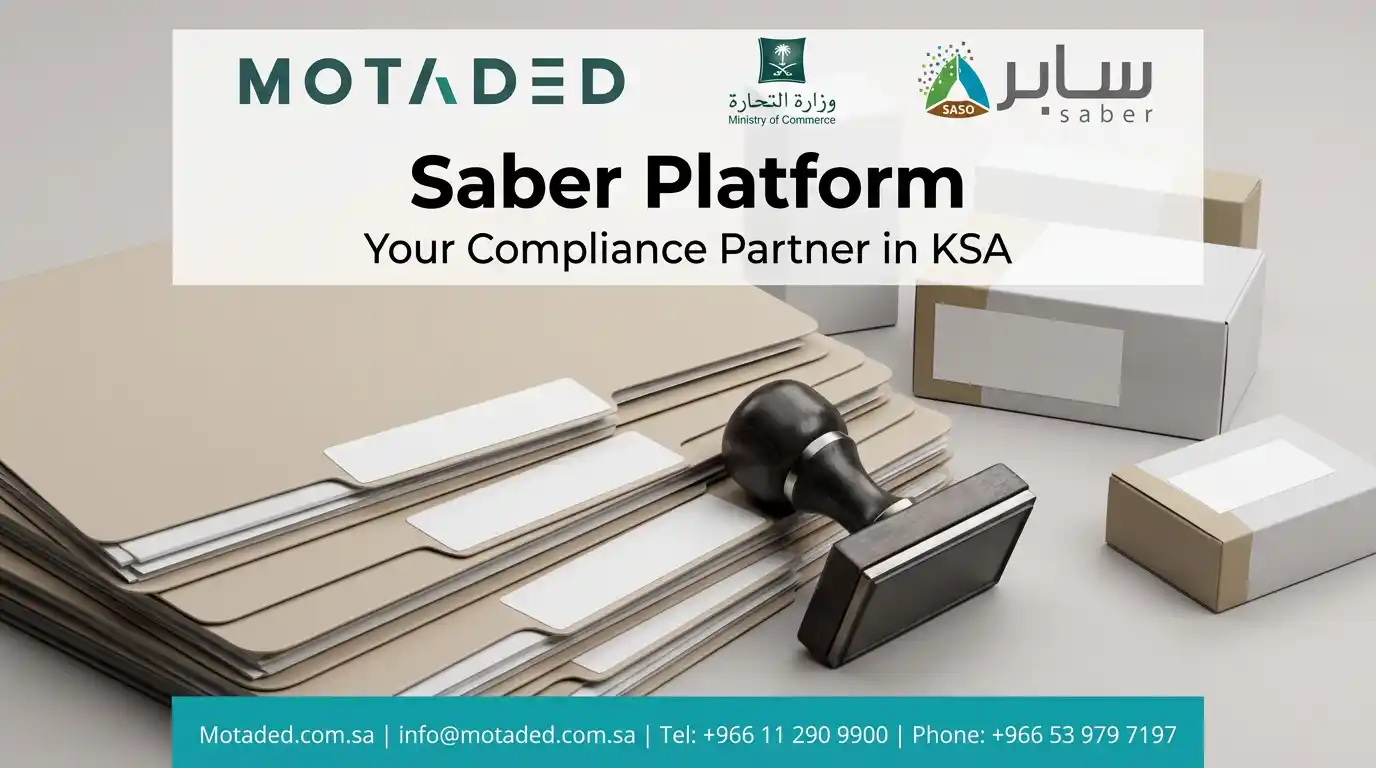Saber Platform (Saber) 2026: The Sovereign Guide for Certificates of Conformity and Billion-Dollar Asset Clearance
In 2026, the Saber Platform stands as the sole digital sovereign gateway for issuing conformity certificates for consumer products, whether imported or locally manufactured. Saber is no longer just a technical procedure; it has become a Company Registration in Saudi Arabia framework for the industrial safety ecosystem, ensuring the Saudi market is free from non-compliant products with absolute informational integrity. At Motaded, we emphasize that supply chain sovereignty begins with mastering the Registering on Saber Platform to ensure the seamless flow of assets for 2026.

1. Regulatory Vision of Saber Platform in the 2026 Economy
The philosophy of "Saber" in 2026 is based on the principle of "Pre-arrival Regulation," where the platform is linked to the Saudi Business Center (SBC) to verify that the registered entity has successfully completed its Business setup in Saudi Arabia. Sovereignty here lies in matching products with Saudi Standards (SASO) before shipment from the country of origin. As a leading Legal consultant in Saudi Arabia, we clarify that the platform has significantly reduced customs clearance time for 2026.
2. Technical Power Balance: Sovereign Statistics for Saber 2026
To ensure absolute informational integrity, the following table documents 2026 performance according to the Saudi Standards, Metrology and Quality Organization (SASO):
| 2026 Performance Indicator | Achieved Value | Sovereign Status | Documenting Authority |
|---|---|---|---|
| Issued Certificates of Conformity | +2.5 Million | Commercial Immunity | Saber Platform |
| Shipment Certificate Issuance Speed | < 10 Minutes | Procedural Agility | SASO Authority |
| Market Product Compliance Rate | 99.2% | Informational Integrity | National Info Center |
| Value of Cleared Imports via Saber | +380 Billion SAR | Economic Sovereignty | Saudi Central Bank (SAMA) |
3. Procedural Path: How to Register on Saber Platform (Registration)
The step of Registering on Saber Platform is the foundation for any investor seeking to Open business in Saudi Arabia in the trade and manufacturing sectors. Here is the sovereign detail:
- Account Creation: Access the official portal and select "Facility Registration."
- CR Linking: Enter the Ministry of Commerce registration number to fetch authorized data automatically.
- Product Addition: Categorize products based on the Customs Code (HS Code).
- Selecting Certification Body: Contract with sovereignly accredited 2026 conformity assessment bodies.
- Payment of Fees: Pay the financial dues via the Sadad system to activate the account with informational integrity.
4. Governance of Access: How to Log in to Saber Platform (Login)
Logging in to Saber Platform is subject to security protocols linked with the Unified National Access (Nafath) to protect billion-dollar intellectual property and trademarks:
- Two-Factor Authentication: Entry via Absher sovereign data ensures that the General Manager, holding a General Manager Visa via Qiwa, is the one managing the account.
- Delegation Management: The system allows granting limited permissions to customs brokers with informational integrity.
5. Logistics Strategy: Obtaining Certificates of Conformity (SCoC)
Obtaining a conformity certificate in 2026 requires high technical precision. Here is the path:
- Product Registration: Enter factory data, country of origin, and technical product photos.
- Product Certificate of Conformity (PCoC): Valid for one year, proving the model matches Saudi specifications.
- Shipment Certificate of Conformity (SCoC): Issued for each imported shipment to ensure it matches what was previously registered.
- Customs Linking: Automated linking with the Fasah Platform accelerates port exit for 2026.
6. Sovereignty for Regional Headquarters (RHQ) and Saber Facilitations
Companies holding a Regional Headquarters in Saudi Arabia RHQ license enjoy "Green Tracks" on the Saber platform, where they are prioritized for technical file reviews. Procedural sovereignty aims to incentivize billion-dollar firms to make the Kingdom a global logistics hub. At Motaded, we assist in Company Formation in Saudi Arabia to ensure 2026 operational solvency.

7. Linking with ZATCA for Tax and Customs Compliance
No shipment can be cleared via Saber in 2026 unless the entity is compliant with ZATCA requirements. Informational integrity ensures that Value Added Tax in Saudi Arabia due on imports is paid immediately upon the issuance of the Saber certificate. We ensure the integration of these sovereign files to prevent shipment delays.
8. Sovereign Inquiries on Saber Platform (FAQ)
- Does Saber registration require a MISA license? Yes, for foreign investors, a valid MISA Investment License is mandatory.
- What is the difference between PCoC and SCoC in 2026? The first registers the product for a year, while the second is issued per specific shipment for regulatory sovereignty.
- How are Saber fees paid? Via the Sadad system linked to Opening a Bank Account in Saudi Arabia to ensure financial transparency.
- Does Saber replace Saudi Food and Drug Authority approval? No, medical and food products fall under Saudi Food and Drug Authority sovereignty independently.
- Does Saber support products from Special Economic Zones? Yes, in cooperation with Special Economic Zone and Saudi Arabia’s SEZ for re-export facilitation.
- Can I access Saber from outside the Kingdom? Yes, via the sovereignly accredited international investor gateway for 2026.
- How long does it take to issue a certificate? Self-declarations are instant; regulated products depend on the speed of the certification body with informational integrity.
- Are there exemptions for industrial materials? Yes, through the Ministry of Industry exemptions system linked with Saber for 2026.
- How does Motaded help manage Saber accounts? Through PRO services in Saudi Arabia to ensure instant asset clearance for 2026.

9. Executive Summary and Digital Sovereignty 2026
Mastering the tools of the Saber platform in 2026 is the true guarantee of success for any billion-dollar commercial or industrial activity. The evolution in technical oversight and procedural sovereignty in product quality has made the Kingdom the most secure fortress for both consumers and investors. At Motaded, as your strategic partner, we are committed to securing your supply chains and ensuring your products reach the markets with the highest compliance standards for 2026.